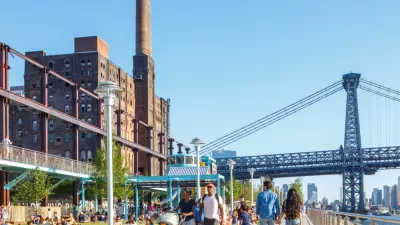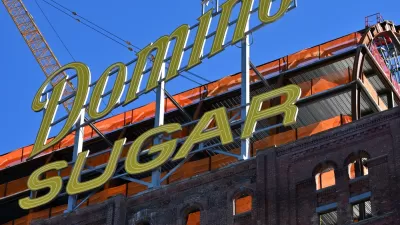Alan G. Brake outlines the redesigned plans to develop the site of the historic Domino Sugar refinery along Brooklyn's East River waterfront. The $1.5 billion plan is the latest, and perhaps last, turn in the site's tortured redevelopment saga.
After prior owners CPC Resources and the Katan Group failed to move forward with their controversial plan for the site, DUMBO developer Two Trees stepped in to save the day. Working with designers SHoP Architects, Two Trees principal Jed Walentas has upped the overall square footage and the heights of the tallest buildings, but also substantially increased the open space, reduced parking, and increased the balance of uses to "create a real neighborhood."
As Justin Davidson notes in his review of the project, "[f]or Walentas, electing to go through the approval process again is like having a root canal just for the hell of it. It’s hard to argue that his motivator is greed, since the new proposal whittles away some market-rate apartments, keeps all the affordable units, adds less-profitable offices, shuts out megaretailers in favor of small stores, and increases the open public space by almost 60 percent. Maybe Walentas really wants what he says he wants: a round-the-clock New Dumbo."
"The city rarely gets this good a chance to extricate itself from a planning mistake," he adds. "Yes, the new Domino would mean more creeping Manhattanization, but that sure is better than the alternative: the New Jersification of Brooklyn."
FULL STORY: A Doughnut at Domino Sugar Site

Maui's Vacation Rental Debate Turns Ugly
Verbal attacks, misinformation campaigns and fistfights plague a high-stakes debate to convert thousands of vacation rentals into long-term housing.

Planetizen Federal Action Tracker
A weekly monitor of how Trump’s orders and actions are impacting planners and planning in America.

Chicago’s Ghost Rails
Just beneath the surface of the modern city lie the remnants of its expansive early 20th-century streetcar system.

Bend, Oregon Zoning Reforms Prioritize Small-Scale Housing
The city altered its zoning code to allow multi-family housing and eliminated parking mandates citywide.

Amtrak Cutting Jobs, Funding to High-Speed Rail
The agency plans to cut 10 percent of its workforce and has confirmed it will not fund new high-speed rail projects.

LA Denies Basic Services to Unhoused Residents
The city has repeatedly failed to respond to requests for trash pickup at encampment sites, and eliminated a program that provided mobile showers and toilets.
Urban Design for Planners 1: Software Tools
This six-course series explores essential urban design concepts using open source software and equips planners with the tools they need to participate fully in the urban design process.
Planning for Universal Design
Learn the tools for implementing Universal Design in planning regulations.
planning NEXT
Appalachian Highlands Housing Partners
Mpact (founded as Rail~Volution)
City of Camden Redevelopment Agency
City of Astoria
City of Portland
City of Laramie




























